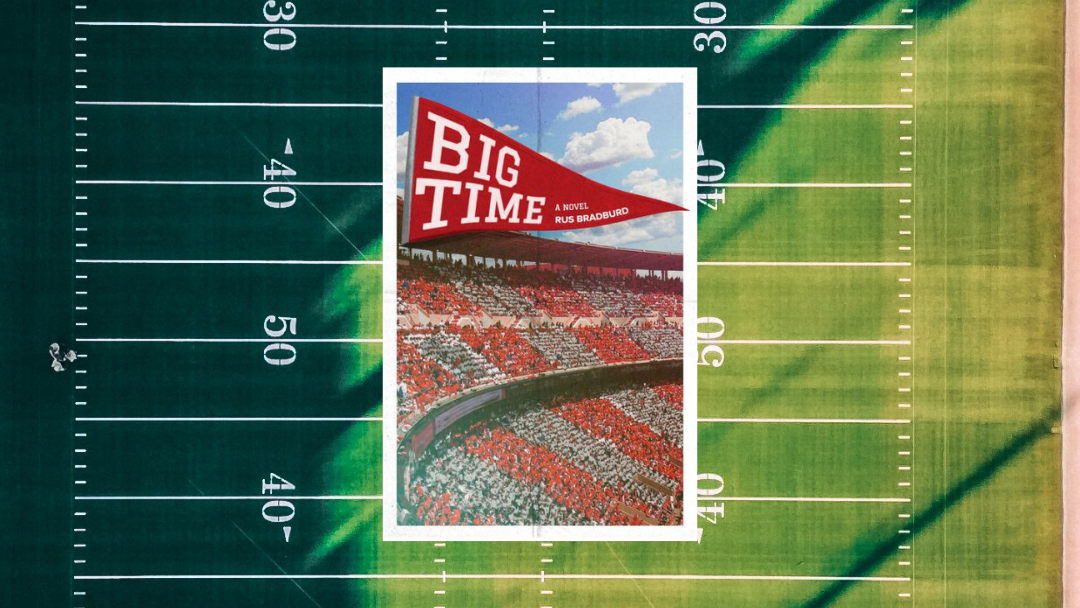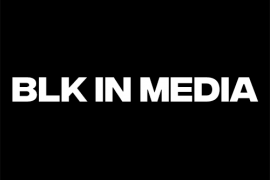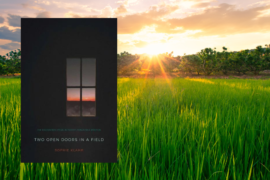Rus Bradburd, whose satiric novel Big Time (Estruscan Press) was released in fall 2024, coached NCAA basketball under Don Haskins of Glory Road fame before he went on to coach his own NCAA teams and moved to Ireland for a year to coach the Irish men’s professional basketball team. While coaching, he began an MFA in fiction, and to date, has published Make It, Take It, a novel-told-in-stories, along with three nonfiction titles that include his memoir Paddy on a Hardwood Floor about his experience coaching the Irish men’s team. Bradburd also is a master Irish fiddler and recently retired from teaching in the creative writing program at New Mexico State University. His fifth and latest book, Big Time, is his second book of fiction and spoofs the often out-sized influence of football (and other college sports) on university campuses.
Ramona Reeves: Thank you for chatting with me about your latest book. I’m excited to dive into your recently released novel, Big Time.
The subject-matter of Big Time is one you seem uniquely prepared to tackle given your experiences as both a NCAA college basketball coach and a college professor teaching creative writing. Did you loosely set out to write a novel that could incorporate your professional experiences?
Rus Bradburd: Major college sports is its own peculiar subculture that has unique etiquette, rules, and arrogance. Since I came from a small college background, the system was a shock to me at first. When I walked away from college coaching, got a graduate degree and lucked into an academic job, I was instantly struck by the sharp contrast in attitudes and rules—as well as the acquiescence and subservient attitude that the faculty had toward big-time sports. I remember being at an early English department faculty meeting where another writer proposed we all stop doing the trivial committee work so we’d have more time to be creative—something we long for as writers. The solution? Form yet another committee to consider the topic. As much as anything, it was the faculty meetings that made me start typing.
RR: This novel is a satire. The university in your book, for example, rebrands itself as Coors State University, the history department works concessions, and the English Department is dissolved but occupies a tent city on campus. Was it fun working on this novel, and about how long did it take you to write?
RB: My wife Connie shouted through the door once, “I hear you laughing in there.” Yes, it was fun to write. I began in 2011, but really, my first step in the process was to teach a class at New Mexico State University called “The Comic Novel.” I’d never tried to write funny before, and I’d never considered different comic strategies. We read Richard Russo’s Straight Man, Pym by Mat Johnson, Joseph Heller’s Catch-22, Tom Perrotta’s Bad Haircut, and Flann O’Brien’s and Lorrie Moore’s books. I worked on Big Time on and off after that, but got distracted by the Chicago gun violence project. Let’s say seven years total I worked on this novel.
RR: The novel has three point-of-view characters: Mooney (a history professor), Layla (a poetry professor), and Trevor (the Coors State quarterback). How did you arrive at those perspectives to tell the story?
RB: Mooney is the work-within-the-system old guy who has almost grown comfortable with academia being shoved aside by big-time sports. Layla is new to the scene and astounded by the ridiculous double-speak and self-defeating strategies. Trevor comes from the athletic side that dominates the university, so it all seems normal to him. I think I made those point of view choices because I’ve inhabited all three mindsets—although in many ways I’m most like the loud-mouthed rebel, Peter Braverman, who’s mostly bluster.
RR: How was it to write Braverman, Mooney, and other characters satirically? Did you encounter any challenges with the form?
RB: An element of “but this is already happening!” kept cropping up. I think in this novel, more than mocking football and big-time sports, is poking fun at progressive professors—like myself—and our silly self-involved impotence. The biggest challenge might have been the time pressure: I wanted to finish the novel and get it out there before the system was revised and football and basketball no longer outranked academics. Thank goodness for the novel that that correction never happened. And likely never will.
RR: Were you inspired by other satirical novels, and if so, did any provide useful models for structuring Big Time?
RB: One of my novel’s professors, Peter Braverman, is obsessed with Mark Rudd, who in real life is an important historical figure. So first, my initial inspiration requires a confession: Mark Rudd is a friend of mine and a hero to me, partly because of what he did in the sixties and seventies. Rudd was a higher-up in the Student for a Democratic Society movement, and after SDS, he became a founder of the Weather Underground, which later went off the rails. What attracted me to Rudd was his stance years later: “It still keeps me up at night wondering what we could have done differently.” I think Rudd was torn between peaceful campus protests about Vietnam and the radical idea that came later of bringing the war home. It’s his willingness to dig deep and look critically at his own role that I find so appealing.
Plenty of writers have lampooned university life: David Lodge, Jane Smiley, Julie Schumacher, and Karen Russell’s Swamplandia was a weird sort of lightbulb in my head, but it was Rick Russo’s Straight Man that hit home the most for me.
I used to have a rule in class: “No talking about movies!” before our creative writing crew [joined] the Creative Media Institute on campus, so my old students will be annoyed to hear me say that a television series was a huge influence: “Detectorists.” Their absurd, self-involved, innocent, silly quests, and the flawed lovability was the sort of tone I was going for.
RR: The novel pokes fun at Coors State, but a big loss occurs near the end. I wonder, what does that loss say about our culture and who wins and loses when corporations get involved on college campuses? And when did you know the loss in the novel would occur?
RB: The late-great poet Bobby Byrd read an early draft, and he told me that somebody had to die. I really resisted that idea, but I think he was correct. Besides the life-and-death loss you’re referring to, the “losses” on campus will never be rectified, either in the novel or on American campuses.
I should also mention the huge influence of Robert Maynard Hutchins. He was the University of Chicago president in the 1930s and 1940s. It’s hard to imagine that powerhouse of academia once competed in the Big Ten, one of the worst conferences in terms of big-time sports dominating campus life. Hutchins saw how football culture was eroding his school’s mission in the late 1930s—and he made the decision to drop football and leave the Big Ten. I’m sure he thought other presidents would copy him. Nope.
RR: I’m curious about the character Sasha. He’s an immigrant who struggles with English and he’s a football lineman, the kind of guy who easily could carry another adult on his shoulders. Sasha also descends from a line of poets in his home country of Croatia. What inspired you to write his character?
RB: I wanted the novel to blend characters who were accustomed to the crazy overemphasis of sports with newbies who might be left to scratch their heads. Sasha is an innocent who is perplexed by the system, and he works against the stereotypical cliché of the dumb football player. He’s a brilliant savant.
RR: I want to also ask about Trevor, who is Sasha’s best friend. Trevor is a talented quarterback who is genuinely connected to one of his professors. He resists the stereotype of the brawny college athlete. What was the inspiration for Trevor’s character?
RB: David Meggyesy dropped out of pro football at the height of his career to work against the Vietnam war. His searing memoir of that time, Out of Their League, was the most important book I read as a teen. While there’s nothing humorous about the racism, violence, and sexism in pro sports at that time, I came to understand that it’s often the convert who is the most passionate and gung-ho about the cause. The rebellious professors in Big Time needed somebody on the football team, an insider, to jump ship and change loyalties. Many of us who wonder about the overemphasis of sport have hoped for a Muhammad Ali, a Billie Jean King, a Jackie Robinson to emerge in college sports and to walk away from the glitz and glamour.
RR: You successfully changed from one career to another, teaching for years and publishing five books. What advice would you give to other writers seeking a similar change in focus?
RB: Coaching college basketball for 14 seasons didn’t leave me the time to write. But there were actually large pockets of time for reading—in hotels and airplanes, mostly. In some ways, when I changed careers, it was easy: I went home the day I quit college basketball and I slept in the same bed, didn’t leave town. I had a huge advantage that other writers didn’t have, and not just being around Robert Boswell and Antonya Nelson, my mentors. More important was that I’d never taken a single English class as an undergrad. I’d read a lot, but not from what might be called “the canon.” To say I was a blank slate would be putting it mildly. It took me seven years to get my MFA, since I was still coaching when it began. So I guess my advice would be to go slow and find great mentors—and leave your opinions and background behind.
Also, I think about Allistair MacLeod a lot. While he’s among the greatest writers in Canada’s history, he only wrote in the summers when he wasn’t teaching. You can have another job. Wallace Stevens and William Carlos Williams did, too.
RR: Any last words about your novel or what you’re working on next?
RB: I can’t seem to settle on a genre or style that might be some sort of trademark, like Dagoberto Gilb or David Shields or Claire Keegan, to name some of my favorite writers. These days I’m struggling to complete a nonfiction book about Syrian and Ukrainian refugees in Ireland.
RAMONA REEVES won the 2022 Drue Heinz Literature Prize and 2022 Texas Institute of Letters award for Best First Book of Fiction for her collection, It Falls Gently All Around and Other Stories. She was a 2024 judge for the Flannery O’Connor Award for Short Fiction and has received support from Kimmel Harding Nelson Center for the Arts, A Room of Her Own, Rockvale Writers Colony and San Ysidro Writers Residency. Previous interviews she’s conducted have appeared in Puerto del Sol, The Rumpus, and Bloom. She and her wife call Texas home.
Like what you’re reading?Get new stories, sports musings, or book reviews sent to your inbox. Drop your email below to start >>>
NEW book release AWRY by duncan b. barlow. Order the book of stories of which Brian Evenson calls “meticulous and precise, painful and surprising.”
GET THE BOOK



